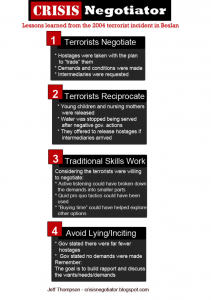
Ten years ago terrorists in Beslan, a town in North Ossetia Russia, seized a school full of children, in what is still one of the deadliest terrorist incidents to have occurred. The incident provides valuable insight with respect to crisis and hostage negotiations that can assist negotiators and government officials to be better prepared if they were to be involved in a similar situation where negotiating with terrorists could be the best option to ensure the least amount of casualties are suffered.
Despite the incident having displayed numerous moments that were clear examples of the terrorists escalating violence, the Beslan incident also offers valuable insight into missed opportunities where negotiators could have employed certain tactics that could have increased the chances for a more peaceful resolution.
A review of this incident, specifically conducted by Adam Dolnik (and co-author of our paper) demonstrates that established crisis and hostage negotiation skills can be effective yet the established methods of determining if a hostage incident can or should be negotiated as well as the methods of measuring progress needs to be reviewed.
Read the full article [HERE] and click the info graphic to see a larger version of it.
